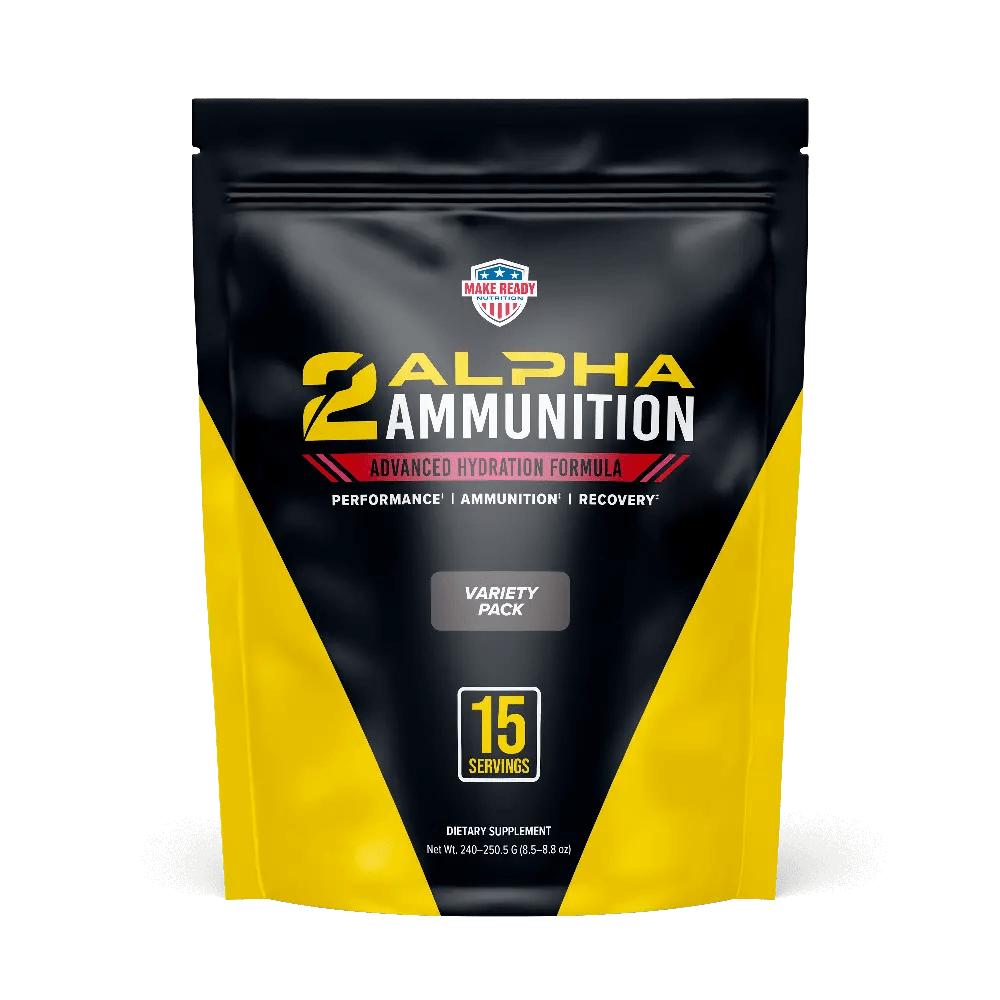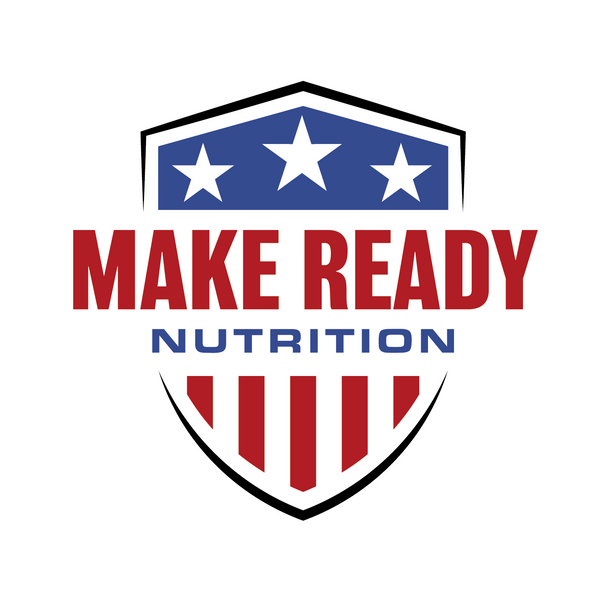
2Alpha Ammunition-Unique
Share
2LPHA unique hydration formula. If you're searching for a single product similar to 2ALPHA Ammunition that combines hydration, BCAAs, ATP (or D‑ribose), vitamin C, and Cluster Dextrin for sustained energy, here’s what’s out there—and importantly, what currently meets that exact spec:
2ALPHA Ammunition: The Closest All‑In‑One Match
2ALPHA Ammunition is specifically formulated to blend:
- Electrolytes for hydration
- Branched‑chain amino acids (BCAAs) for muscle recovery
- ATP (via D‑ribose) to support energy production
- Vitamin C for immune and antioxidant support
- And clean carbs for stamina and athletic performance
There are no other products on the mainstream market—including sports nutrition lines—that combine all five elements in a single formula exactly like 2ALPHA does.
Products with Partial Overlap
Here are some options which meet parts of your criteria, but none fully:
-
LivPur Hydrate
Offers electrolytes, vitamin C, vitamin B6/B12, some amino acids (including BCAAs), and cluster dextrin for sustained energy—but it does not include ATP or D‑ribose LivPur Nutrition. -
Xwerks Motion High‑Carb Hydration Powder
Combines electrolytes, BCAAs, and cluster dextrin for endurance—it does not include vitamin C or ATP components. ACTIVE.comAmazon. -
TriFuel 3‑in‑1 Endurance & Recovery
Contains hydration support, BCAAs, electrolytes, and vitamin C—but lacks ATP or Cluster Dextrin in the formula Amazon. - GU Roctane products include high BCAA counts, electrolytes, amino acids like histidine—but lack vitamin C and cluster dextrin in one mix Wikipedia.
🧪 Ingredient Comparison
|
Product |
Electrolytes |
BCAAs |
ATP (D‑ribose) |
Vitamin C |
Cluster Dextrin |
|
2ALPHA Ammunition |
✅ |
✅ |
✅ |
✅ |
✅ (natural carb) |
|
LivPur Hydrate |
✅ |
✅ (incl. BCAAs) |
❌ |
✅ |
✅ |
|
Xwerks Motion |
✅ |
✅ |
❌ |
❌ |
✅ |
|
TriFuel 3‑in‑1 |
✅ |
✅ |
❌ |
✅ |
❌ |
Final Take
Yes—2ALPHA Ammunition is currently unique in packaging hydration, BCAAs, ATP (via D‑ribose), vitamin C, and Cluster Dextrin-style clean carbs into one formula. No other mainstream drink mix or supplement integrates all five components comprehensively as it does Make Ready Nutrition
If you're looking to replicate that blend with multiple products:
- LivPur Hydrate covers everything except ATP.
- You could pair it with a D‑ribose powder or ATP supplement
- Here’s the official dosage and instructions for 2ALPHA Ammunition based on Make Ready Nutrition guidance:
Recommended Dosage & Use
- One scoop or single-use stick pack is the standard serving size.
- Mix with 10–12 oz (≈300–350 mL) of water per serving
- Inside each scoop, the formula includes approximately 5 g of D‑ribose along with electrolytes, BCAAs, vitamin C, zinc, calcium, magnesium, and clean carbohydrates.
Timing Guidance
- Drink one serving per phase of activity—e.g.:
- Per stage in a shooting match
- Every 30–60 minutes during range training or workouts
- During WODs or extended athletic session
Proper adherence to these recommendations ensures optimal performance benefits and consistent nutrient delivery throughout periods of exertion. The combination of ingredients is specifically chosen to replenish what your body expends in high-intensity environments, helping maintain focus and endurance over time.
Safety & Notes
- Formulated to support hydration, energy (via ATP production), stamina, muscle recovery, and immune health.
- Consult your doctor before using this or any supplement, especially if you have underlying health conditions or take medications
In Summary
| Component | Amount / Instruction |
| Serving size | 1 scoop or 1 single-use stick pack |
| Water volume | 10–12 oz (300–350 mL) per serving |
| Usage frequency | Every 30–60 min during activity |
If you're considering 2ALPHA Ammunition and wondering whether it's safe for individuals with diabetes, here’s what to know:
Key Notes on Ingredients & Sugars
- Each serving contains about 5 g of natural sugar, sourced from D‑ribose, which is metabolized by the body to support ATP production—but still contributes to blood glucose levels.
- Beyond D‑ribose, the formula includes electrolytes (sodium, potassium, magnesium, calcium), BCAAs, vitamin C, and cluster dextrin—but lacks total carbs or sugars labeling, making a precise glycemic impact unclear.
Diabetes Considerations
- Blood sugar impact
- Although D‑ribose is a natural sugar, it can still raise blood glucose—especially in sensitive individuals or those with limited insulin response.
- Because full carbohydrate content and glycemic index aren’t disclosed, it's hard to estimate total glycemic load.
- Electrolyte benefits and risks
- Replenishing electrolytes is useful during dehydration-tight situations, but diabetics should monitor especially potassium and magnesium intake if on medications or with kidney conditions.
- Potential benefits vs caution
- The BCAAs and vitamin C may assist with recovery and inflammation—but any potential benefits must be weighed against glucose control risk for diabetics.
✅ What to Do if You Have Diabetes
- Consult your healthcare provider before using, especially regarding carbohydrate and sugar intake.
- Monitor blood sugar closely when first trying—even with a single serving—to see how your body responds.
- Track carbohydrate intake in your overall diet to ensure this product fits within your glucose targets.
- Alternate options: If blood sugar spikes are problematic, consider alternatives that are sugar-free, low-carb, and still include electrolytes and recovery amino acids.
📋 Summary Table
| Aspect | Details for Diabetics |
| Sugar content per serving | ~5 g from D‑ribose |
| Glycemic impact | Possible blood glucose elevation |
| Electrolytes present | Yes; useful but requires monitoring |
| Ingredient transparency | Partial—total carbs and glycemic load not specified |
| Recommendation | Use with caution; only under medical guidance |
Bottom Line
2ALPHA Ammunition may raise blood sugar levels due to its 5 g of D‑ribose—the glycemic impact isn’t well-defined, making it potentially risky for diabetics. If you're diabetic or pre‑diabetic, it's safest to:
- Talk to your doctor,
- Monitor your blood glucose when trying,
- Compare it with low- or zero-sugar electrolyte/BCAA products that better fit your glucose management.
